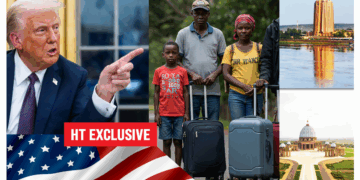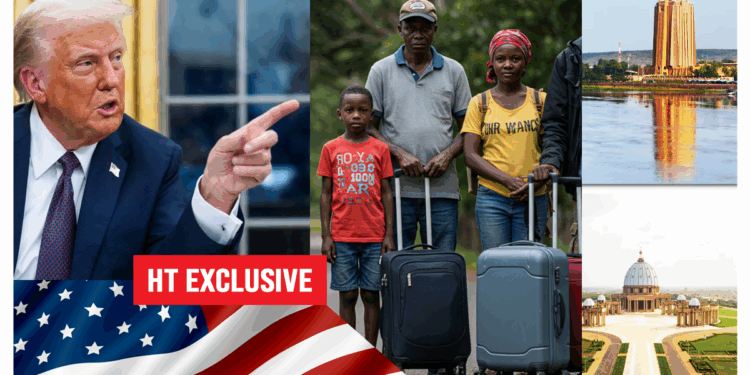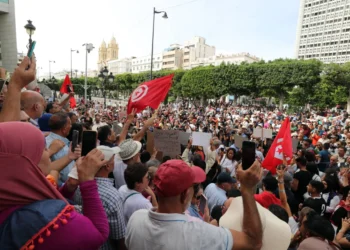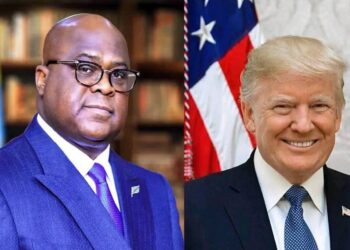By Emmanuel Nduka Obisue
In recent months, African nations including Rwanda, South Sudan, Uganda, and Eswatini have quietly agreed to accept deportees from the United States under President Donald Trump’s directive. While the numbers remain small compared to the 1.6 million people the US Department of Homeland Security says have left the country during Trump’s first 200 days in office, these deals reveal a complex mix of diplomacy, aid, and political bargaining.
HT Exclusive spotlights possible reasons why African leaders are taking this offer with both hands:
1. Aid, Sanctions, and Diplomatic Leverage
One of Washington’s strongest tools in pressuring countries to take deportees has been its use of visa restrictions under the Immigration and Nationality Act (INA 243d). South Sudan, which initially resisted removals, agreed in July this year to take eight deportees, only one of whom was South Sudanese. The decision was framed by Juba’s foreign ministry as “a gesture of goodwill, humanitarian cooperation and commitment to mutual interests”. Shortly after, the United States lifted visa restrictions it had imposed on South Sudanese officials in April. Activists in Juba noted that the government is hoping this cooperation will pave the way for broader sanctions relief, including on an arms embargo that has crippled its defense capacity.
Uganda has also faced similar pressure. As one of the world’s top refugee-hosting nations, with about 1.9 million displaced people on its soil, Kampala relies heavily on US support, particularly for its HIV/AIDS programs under PEPFAR. Foreign Minister of State Henry Okello Oryem recently underscored that Uganda would consider taking non-criminal deportees but raised concerns: “How can we integrate them into local communities in Uganda?” he asked. The statement underlined Uganda’s tightrope walk between satisfying US demands and managing its already stretched humanitarian resources.
2. Development Sweeteners and Service Packages
Rwanda’s decision to accept up to 250 vetted deportees has been closely watched across the continent. The first seven migrants arrived in Kigali in mid-August, where, according to government spokesperson Yolande Makolo, they are being provided with health care and workforce training. Their support is being coordinated by an international agency with oversight from the International Organization for Migration (IOM). While officials have been vague about the financial details, the arrangement recalls Rwanda’s controversial 2022 migration pact with the United Kingdom, which promised hundreds of millions of pounds in development assistance before it was later abandoned.
3. Humanitarian Branding and Refugee Management Experience
For some governments, participation in these agreements bolsters their global reputation as humanitarian actors. Uganda already manages the largest refugee caseload in Africa and the third largest globally, while Rwanda has long operated camps hosting between 120,000 and 135,000 refugees. Both governments present the new deportee arrangements as extensions of their existing “open-door” refugee policies. In practice, this positioning helps attract international aid at a time when donor fatigue and funding cuts threaten essential services.
4. Political Bargaining and US Cover
Critics argue that the deals are less about humanitarian compassion and more about political bargaining. In Uganda, opposition MP Muwada Nkunyingi accused President Yoweri Museveni’s government of being “desperate for U.S. backing” and warned that Washington should not “turn a blind eye” to rights abuses in exchange for deportee cooperation. In Eswatini, where the government accepted five non-African deportees in July, rights groups led by the Southern Africa Litigation Centre have challenged the move in court, claiming the monarchy is seeking trade concessions or muted criticism of its rights record. Attorney General Sifiso Khumalo dismissed the litigation as a “frivolous legal application,” but the controversy highlights how migration deals can become a bargaining chip in broader diplomatic negotiations.
5. US Messaging and Deterrence Strategy
Beyond the individual cases, experts say these partnerships are about optics. The Migration Policy Institute noted that such deals are “more about messaging and deterrence, trying to get people to self-deport and trying to deter others from coming to the US-Mexico border”. This is significant at a time when US immigration detention remains high, with about 59,000 people in custody as of mid-August, according to Syracuse University’s TRAC project. Although the numbers being sent to Africa are negligible compared to overall deportations, they allow Washington to project an image of global cooperation on removals.
Risks and Backlash
Not everyone is convinced these arrangements are sustainable. Human rights groups warn that deporting individuals to “third countries” where they have no ties risks violating international law on refoulement. In Rwanda, the U.S. arrangement is already being compared to the UK scheme struck down by British courts. In Uganda, humanitarian agencies warn that the refugee system is under severe strain due to global aid cuts, making the addition of deportees politically and logistically risky.
The deportee agreements highlight the intersection of migration control, diplomacy, and aid politics. While Washington frames them as part of a global solution to irregular migration, African governments appear to be leveraging them for development support, political cover, and sanctions relief. Whether these deals hold in the long run remains uncertain, but for now, they reflect a new era in US–Africa relations, one in which human mobility has become a bargaining chip in geopolitics.




































